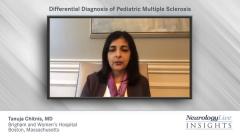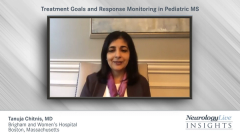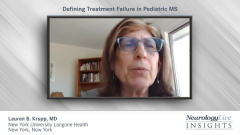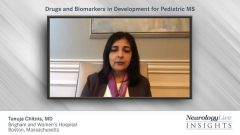
The Future of Pediatric Multiple Sclerosis
Tanuja Chitnis, MD and Lauren B. Krupp, MD give insight into the future of pediatric multiple sclerosis by discussing unmet needs and advice for community neurologists.
Episodes in this series

Tanuja Chitnis, MD: Some of the unmet needs for pediatric MS [multiple sclerosis] I think are the number of treatments available; we have 1 therapy approved by the FDA, which is great. However, it’s very important to have additional FDA-approved therapies so that we can have an armamentarium to choose from. If someone is either not able to take one therapy or is not doing well, then we can switch to another type of therapy. It’s very important to have these clinical trials, which will hopefully lead to FDA-approval of more treatments for pediatric MS. I also think another important paradigm in the treatment of pediatric MS is to start with a higher efficacy treatment. I tend to do that in my clinic rather than starting with an induction treatment or lower efficacy and seeing how things go, because we know that time is brain. If relapses do occur, that might be damage that’s long term and might have long-term effects.
Lauren B. Krupp, MD: Due to pediatric MS being associated with a higher relapse rate compared to adults, I believe the future is going to be geared toward getting control of relapses early and aggressively. That means using high-efficacy medications in the pediatric age group. What I’m not sure about, and what I think future research is going to need to address, is whether after disease control has been achieved, do we decrease the dose or lengthen the frequency of administration of those agents? Or, whether by starting with a high-efficacy therapy for a short period, 2 years say, good results and better safety could be achieved by de-escalating to potentially something that’s more in the moderate range with respect to efficacy. That’s one possibility. More needs to be done to improve the safety of these agents in terms of long-term use. I do believe we will get to a point where we have medications that are great at stopping the disease, halting the development of atrophy, and minimizing adverse effects, so that kids with MS, like kids without MS, can go ahead and live normal, healthy, and productive lives; they should be able to do that now. I tell parents and the kids themselves they should go out there and not be limited in terms of their interests, hobbies, activities; this is a condition that we can control very effectively now and even better in the future.
Tanuja Chitnis, MD: My advice for community neurologists who are treating pediatric MS is to think about the overall disease activity of that young person. Recognizing that it’s an active disease and that these patients have high relapse rates might push you toward a higher efficacy treatment. Really consider that strongly, because again, this is time that is lost if a relapse does occur; it is potentially disability down the road. If one is not fully comfortable with some of these questions or therapies, then consider working with or referring a patient to a pediatric MS center that might be able to do a consult or help with the management of this young person.
Lauren B. Krupp, MD: My advice for community neurologists in treating kids with MS is that if this is a patient group you’re not comfortable with, communicate with someone who sees a lot of kids. It absolutely does not mean that you need to give up the care of that patient. However, there are a lot of neurologists who specialize in pediatric MS who are eager to provide a helping hand and guidance. You don’t want to undertreat these patients. The accumulation of lesions is not a good thing in the brain of individuals with MS. Relapses are to be avoided; effective therapy is important. There’s a lot of opportunity to get help in management. There also, through the National MS Society, are programs where difficult cases can be presented.
The National MS Society has a difficult case conference where community neurologists, pediatric neurologists and adult neurologists can present challenging MS cases or cases for which they’re not sure what the diagnosis is. They’re discussed by a group in a HIPAA privacy rule-compliant manner. So resources are out there. There are also resources for families, and it’s important to recognize that we’re all in this together with the goal of making it easier for these families.
Transcript Edited for Clarity
Newsletter
Keep your finger on the pulse of neurology—subscribe to NeurologyLive for expert interviews, new data, and breakthrough treatment updates.





















